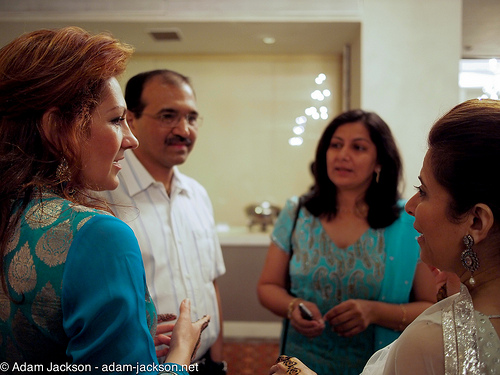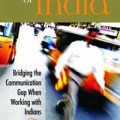Mastering Small Talk in India
In the West, small talk serves the same purpose as the kiddie side of a cold swimming pool. You wade in slowly, throwing around meaningless comments about the weather and sports until you reach an equilibrium and then dive in to the deep stuff.
Not so in India.
In India, small talk is an investigation. Your conversation partner is trying to piece together something about you. Who are your parents? What do they do? Where do you work? Where did you go to college? How many children do you have? What is your wife’s name? Do you have brothers and sisters?
These are not just polite conversation starters; these are interrogation questions.
Your Indian partner has two goals in this interrogation.
The first is to categorize you. Because of India’s diversity, they don’t look at each other simply as Indians. Each person is a particular kind of Indian: a Bengali, a Telegu Reddy, a Sardarji. Categorizing might sound like stereotyping, but in a country with so many people, it’s helpful to at least have a general classification to put someone in. Small talk helps them decide what category to put you in. #IndiasNotIndia
The second is to find a way to get you into their circle. They are filtering and storing every piece of personal information you give and figuring out how they might be able to help you or vice versa. They discover you used to work at Microsoft, and their son is applying there; do you still know anyone there who would be good to talk to? They find out you have some problems getting your child admitted to a certain school; as it turns out they went to college with one of the top administrators there. The more people in their circle, the better. #See1See100
Four Things Indians Wish You Talked More About:
1.) Family – This is both your family and theirs. If you don’t talk about family with an Indian, you have not really talked with them. They want to know about your family including your parents, spouse, brothers, sisters, children, and grandchildren. Share openly about these people: where they are, what they are doing, where your kids are studying. If you come to India on a trip, bring pictures with you.
If you have a complicated family situation, practice saying a simplified version. If you’ve been divorced twice, but are now living with your first wife again, along with children from your second marriage, no need to give the full explanation unless you are really sharing with a close friend. Keep it simple.
They also want you to ask about their family. Where are your children studying? What did your father do? How is your mother doing? Is your sister still in Singapore? How is your granddaughter doing in the US? Do you get to talk often? Will you all be together for Diwali this year? How was your grandson’s first birthday? How did your father’s 60th birthday party go?
These questions will instantly endear you towards your Indian friends. I’ve also found Indians to be extremely authentic in asking about my family after a relationship is established. When my grandmother had a major surgery, my friend kept asking how she was weeks afterwards. I rarely start a conversation with anyone I know without first answering how my kids are doing. This is a great part of India, and also a clue to let you know they would like you to show the same kind of care and concern.
Indians also sometimes have complicated family situations and will signal it by being a little indirect or vague. If you ask a woman where her husband works and she mentions a different city, that can sometimes be a euphemism for a separation or divorce and shouldn’t be pressed.
2.) Celebrities – People love to talk about famous people in India. As a newcomer, you should refresh yourself on the People You Should Know, so you can participate in discussions somewhat intelligently.
Cricket is an easy, ubiquitous topic in India, and cricketers are easy celebrities to spot due to all the ads they appear in. Even if you can’t tell the difference between a leg spinner and a pace bowler, you should at least know who Sachin Tendulkar and MS Dhoni are. The Indian Premier League (IPL) is a huge conversation piece. Each major city has its own team with its own stars. All Indian cricket fans have a favorite player and will enjoy telling you why they are the best.
Politicians quickly become celebrities and conversation pieces, if for no other reason than their pictures are up on every roadside. Knowing the major players will help you stay up on current events. It is likely that you will need to know some of the national leaders as well as regional ones.
Business leaders are much more popular here than in the West. While the average American might only be able to name a few big name business leaders, most Indians could easily list off the names of 10-20 very powerful CEOs of companies like Reliance Industries, ICICI Bank, PepsiCo, Tata Industries, Aditya Birla, and so on.
Film stars top the list in terms of mass appeal. People from all strata of society will be able to recognize names like Amitabh Bachchan, Rajnikant, Aamir Khan, and the like. You should at least know a few names and faces so you don’t look foolish when you can’t pick Shahrukh Khan out of a line up.
3.) Travel – There are two specific kinds of travel Indians generally want to talk about. First is their travel to international locations. Classic Indians will have likely taken one or two international trips in their lives, while New and Wealthy Indians might travel abroad frequently. They love to share their experiences with you.
The other kind of travel you can speak about is your travel inside India. They will want to know if you’ve visited all the famous places near their home and will give you tips on the best locations to visit. Be ready with a list of all the places you have visited or plan to visit and what you like about those places!
4.) Proudly Indian – In this category is anything that is uniquely Indian that Indians are very proud of. Topping the list would probably be Ayurveda, an ancient form of health care that is still practiced in some form today. Indian philosophy, mythology, scientific achievements (like the recent rocket launch to Mars), and economic successes are also great topics.
Six Things Indians Wish You Talked Less About:
Worried about bringing up a taboo topic? Avoid these things.
#1 Skin color – So often you see Westerners coming into India and they start talking about being white. Those who stay here joke about being a “white Indian”, or about the “white tax”, or how they stand out because they are “white”.
Stop doing that.
Skin tone/colour in India is a seriously sensitive issue that you probably never knew about. There is a gigantic amount of social pressure to be “fair skinned”.
Gigantic as in the skin lightening industry has the biggest celebrities endorsing their products, pulls in more than $432 million per year in India, and their products outsell Coca Cola.
In matrimonial ads (seeking arranged marriages), where you only get 25 words to describe someone, the words “fair”, “light”, or at least “wheatish” are guaranteed to appear. When my friend’s brother was born with darker skin than his two older brothers, the mother wondered what she did wrong.
One day, my wife was talking to some girls around our flat who had just started the school year. She asked if they liked their teacher. “Yes, she is nice.” Is she fair? “No, she is dark.”
My wife realized the serious error she had made. She was trying to ask if the teacher treated everyone equally, but these girls thought she was asking about the “beauty” of their teacher.
Hopefully you can start to see how your casual comments about being white aren’t helping anything around here. The farther south you get the more of an issue it is as skin tones tend to be darker.
If you need more convincing, read the comments after this interesting article to get a feel for the sentiments around the issue.
#2 – Caste – Talking about caste is a very sensitive subject, especially with foreigners. Indians know the world does not hold a high regard for the word. You might find that a Brahmin will reveal his/her caste in conversation at some point, but no one else is likely to do it. We’ll talk about caste more in an upcoming article, but remember that caste itself only means the larger community one belongs to. It’s ok to ask about someone’s larger community, but stay away from the word “caste”.
#3 – Cows – This encompasses all forms of Hindu/Indian practices and superstitions you might find strange – such as worshipping the cow. You may think, “If they worship the cow, why do they let it sit on the road where it can get run over and let it eat garbage?” You will see lots of things you may find silly or contradictory in their culture and religion. Just remember that you likely have just as many silly and contradictory things going on where you are from, you’ve just never had a foreigner point them out to you. Leave these questions in your head and only ask them in the safety of a one-on-one conversation with a good friend. These questions come across as criticizing India, which is never a good idea.
#4 – Pakistan – Actually, many Indians would love if you talked more about Pakistan as long as you are only criticizing them and not trying to be diplomatic. However, you are unlikely to understand the full sentiments and may find yourself in a conversation you wish you could get out of. India and Pakistan are not friends, and most Indians find it incomprehensible that any foreign nation can have good relations with India AND Pakistan. This includes discussions on Kashmir as well. It is unlikely that you understand the strength of their feelings about this, so it is a minefield you should avoid at all costs.
#5 – English Skills – According to Education First, India has the third highest English proficiency in Asia (after Malaysia and Singapore). It has a greater proficiency than France, Italy, Russia, and Spain. Those stats include all layers of India as well. If you were to only include Wealthy, New, and Classic Indians, the proficiency would be even higher than most European countries.
While you shouldn’t expect every person you meet to speak excellent English, it can be pretty offensive to say to your business colleagues, “Wow, your English is so good!” when they speak it in the office every day, even when you are not around.
#6 – Your home country – In my first few months in India, at some point in every conversation I would say, “You know, in the US…” or “That’s interesting, in America…”. Even though my friends never mentioned it to me, looking back, I’m sure this was really annoying to them. If you feel the urge to talk about your home country all the time, stop, smile, and then ask another question about their family.
If you need more taboo topics, check out this funny article about questions Indians are sick of answering.
Uncommon (to you) Indian Conversation Starters:
Here are a few strange ways Indians want to get conversations going with you and how to respond.
“Had your lunch/breakfast/dinner?” – In the same way that Americans ask “How are you?” without expecting a genuine response, Indians are not asking this question to find out the entire menu you just ate. It is just a polite way to start a conversation. You can respond with “yes” and ask them the same.
“You are looking dull today” – This is not a comment on your intellect or personality. When you come to work one morning after not getting much sleep because the next-door temple was blaring music at 4am, you might look a little ‘dull’. You might interpret this as “Wow, you look terrible today!” Better to reinterpret this as “I appreciate you and am paying attention to your life. Today you don’t look quite as cheerful as usual. Anything I can help with?”
“Your baby has lost weight!” – If you have a child in India, you will likely hear this at some point. You should translate this question as “I love your child very much and hope that he/she is healthy.” Otherwise you will interpret it as “Are you feeding your baby? Do you care about your child?” I heard one expat answer this question with “Yes, actually we are starving him everyday just to see what happens.” Sarcasm won’t get you very far here. Just brush off the question as best you can.
“You are getting a little fat” – In many Asian countries, comments about weight are not as sensitive as the West. It is more of an observation than an insult. When they start with “You’ve lost weight (or ‘reduced’)”, that can be said more as an accusation. Like “Hey, what is wrong with you, aren’t you eating right?” See the comments on this post for more of the Indian interpretation of this.
Now you are ready to go out and have some great conversations!
Photo Credit: Adam Jackson on Flickr






Great post! Indian small talk is truly an investigation….so funny!
Thanks! You would know I think!
Thanks, very useful!
Thanks for the feedback; glad you liked it.
Enjoyed your article – I would add one “no go” topic which is “slums”, a topic which seems to be the dominant one for Australians visiting India (of course it is, with our egalitarian outlook and tall poppy syndrome). I occasionally write on these topics for ASIA TODAY and here is a relevant piece:
http://asiatoday.com/pressrelease/offshoring-and-internet-mean-cross-border-manager-needs-skills-act-globally-while-stayi
Thanks for the good addition. It is very true as well.
One word: Astute!
Absolutely loved it. The what NOT to talk about, as an Indian I had never consciously realised that those issues truly are difficult to discuss with a foreigner.
Thanks, Ankit. Glad you can confirm that the NOT section is a little difficult to discuss. I wish someone would help me figure out all the things that Americans get anxious to talk about that we are not aware of!
Usually Americans try to avoid talking about sex, religion, or politics. (Though there are always people who love those subjects as well.) And as you already alluded to, comments about appearance (such as weight) are usually considered offensive if you aren’t a close friend.
Another great article – and again i could relate to every single word! It took me a while to understand all these points myself. I´m still feeling funny about these comments: “Oh, you lost some weight!” or “Oh, you look plummy!” “Hanna, you have become fat!” It never ends! 😀
this article is helpful. I wanted to email you but I can’t find an email address. May I have it? Or could you email me? jcotton648@aol.com
It’s on the About page